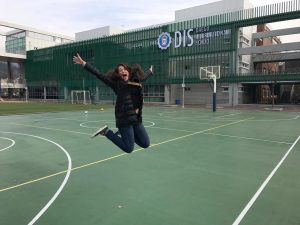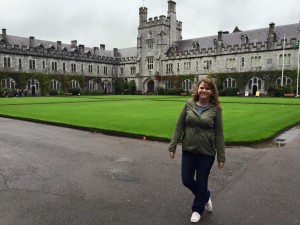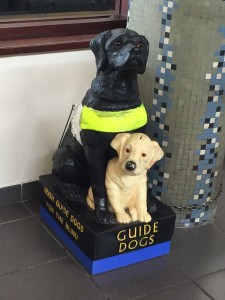 The University of Maine at Farmington currently has four teacher candidates conducting their student teaching at the Daegu International School in Daegu, South Korea. The Daegu International School (DIS) has a partnership with UMF that allows students to conduct their student teaching internationally while meeting all of the requirements to receive their degree. Tori Lands and Kayla Girardin were able to share their experience and discuss various challenges, opportunities, and stores from their experience.
The University of Maine at Farmington currently has four teacher candidates conducting their student teaching at the Daegu International School in Daegu, South Korea. The Daegu International School (DIS) has a partnership with UMF that allows students to conduct their student teaching internationally while meeting all of the requirements to receive their degree. Tori Lands and Kayla Girardin were able to share their experience and discuss various challenges, opportunities, and stores from their experience.
Student teaching abroad provides students with the opportunity to use and build on their skills and professional de velopment while traveling and immersing in a new culture. Tori always had an interest in studying abroad but was not sure if it would work out for her in an education major, until she learned about student teaching abroad. “I believe that one of the most important responsibilities educators have is to help guide students to becoming global citizens,” says Tori, while discussing some of the reasoning behind her decision to go abroad. “I feel as if my time at UMF both as a secondary education/ social studies major and an International Global Studies minor have greatly influenced my ability to be a compassionate and conscientious member of society. I hope to be able to foster these qualities in my future students and feel as if going abroad is allowing me to build on the foundation UMF gave me as well as develop my own understanding of what it means to be apart of the global community.”
velopment while traveling and immersing in a new culture. Tori always had an interest in studying abroad but was not sure if it would work out for her in an education major, until she learned about student teaching abroad. “I believe that one of the most important responsibilities educators have is to help guide students to becoming global citizens,” says Tori, while discussing some of the reasoning behind her decision to go abroad. “I feel as if my time at UMF both as a secondary education/ social studies major and an International Global Studies minor have greatly influenced my ability to be a compassionate and conscientious member of society. I hope to be able to foster these qualities in my future students and feel as if going abroad is allowing me to build on the foundation UMF gave me as well as develop my own understanding of what it means to be apart of the global community.”
While teaching abroad, students are exposed to a different school system and classroom structure that they may not be used to. It can be challenging going into a new classroom with expectations and situations that you may not have experiences with. Kayla found this to be a challenge at first. “Many of my students are ESL (English as a Second Language), which challenges me to differentiate instructional strategies,” she said. “There is no Special Education here, so there may be students with learning differences who do not receive services because there are none to offer. It is interesting for me to see the difference between the way disability is perceived here compared to the United States since I have a minor in Special Education.” Kayla has since adjusted to these challenges and has been able to connect to her students, which she believes is the most important aspect of teaching.
Tori has found the cultural differences between Maine and the students she teaches at DIS to b e most interesting. Maine is not as diverse as DIS, as Tori has students in her classroom from Korea, America, China, the Philippines, Japan, Australia- just to name a few. The diversity in her classroom has allowed her to learn from her students as well. “Instead of just reading about different cultures and countries these students can share personal stories and experiences,” Tori said. “It has been challenging to make sure I am sharing content in a way that makes sense to all the different learners in my classroom and making U.S. history relevant to students who may have only been to the states once or twice is interesting.” Both Tori and Kayla believe the cultural experience that students gain when teaching abroad has been much richer than teaching at home in the states.
e most interesting. Maine is not as diverse as DIS, as Tori has students in her classroom from Korea, America, China, the Philippines, Japan, Australia- just to name a few. The diversity in her classroom has allowed her to learn from her students as well. “Instead of just reading about different cultures and countries these students can share personal stories and experiences,” Tori said. “It has been challenging to make sure I am sharing content in a way that makes sense to all the different learners in my classroom and making U.S. history relevant to students who may have only been to the states once or twice is interesting.” Both Tori and Kayla believe the cultural experience that students gain when teaching abroad has been much richer than teaching at home in the states.
Are you interested in students teaching or studying abroad, but don’t know where to start?
There are many resources on campus to help, including your academic advisor, the Financial Aid department, the Study Abroad office, and more! “The logistics of planning for the trip can get hectic and overwhelming, so don’t be afraid to ask questions,” advises Kayla. “Reach out to people who have done it before and see what they have to say about it. Research the country you’re going to and be aware of the culture, history, and language. See if there are any places nearby you would like to travel to during any breaks and work those costs into your budget. If you’re going to be abroad, make the most of it! Your student teaching responsibilities come first, but don’t forget to truly experience the country you’re in. Get involved as much as you can with the school as well because it will help you make more connections with teachers and students.”

It can be scary and overwhelming to go abroad, but students find it to be very worth it. “I think it is easy to stay in places and environments that are comfortable and when thinking about the joys and obstacles that come with student teaching it may seem overwhelming to go abroad, but I have already seen growth in both myself and my teaching because of this experience,” says Tori. “I am confident that it will have lasting benefits in both my personal and professional life.”
If you are interested in studying or teaching abroad, you are encouraged to talk to your advisor and whomever else might be able to provide more information about the process. Take advantage of the opportunities that UMF offers, as these opportunities may not present themselves again.
Thank you Tori and Kayla for sharing your expereince in South Korea so far. On behalf of the UMF community, we wish you luck with the remainder of your endeavors.

 e Deaf, both Americans and Irish went to the same country to learn it, which was France. I found that really neat! That being said, there are a few differences I’ve also found. First, there seems to be a lot more non profit organizations supporting people with disabilities in Ireland. For example, one of my first days going into the city, there were some people asking for donations for
e Deaf, both Americans and Irish went to the same country to learn it, which was France. I found that really neat! That being said, there are a few differences I’ve also found. First, there seems to be a lot more non profit organizations supporting people with disabilities in Ireland. For example, one of my first days going into the city, there were some people asking for donations for 